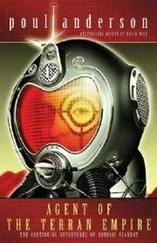Poul Anderson - Star of the Sea
Здесь есть возможность читать онлайн «Poul Anderson - Star of the Sea» весь текст электронной книги совершенно бесплатно (целиком полную версию без сокращений). В некоторых случаях можно слушать аудио, скачать через торрент в формате fb2 и присутствует краткое содержание. Жанр: Фантастика и фэнтези, на английском языке. Описание произведения, (предисловие) а так же отзывы посетителей доступны на портале библиотеки ЛибКат.
- Название:Star of the Sea
- Автор:
- Жанр:
- Год:неизвестен
- ISBN:нет данных
- Рейтинг книги:5 / 5. Голосов: 1
-
Избранное:Добавить в избранное
- Отзывы:
-
Ваша оценка:
- 100
- 1
- 2
- 3
- 4
- 5
Star of the Sea: краткое содержание, описание и аннотация
Предлагаем к чтению аннотацию, описание, краткое содержание или предисловие (зависит от того, что написал сам автор книги «Star of the Sea»). Если вы не нашли необходимую информацию о книге — напишите в комментариях, мы постараемся отыскать её.
Star of the Sea — читать онлайн бесплатно полную книгу (весь текст) целиком
Ниже представлен текст книги, разбитый по страницам. Система сохранения места последней прочитанной страницы, позволяет с удобством читать онлайн бесплатно книгу «Star of the Sea», без необходимости каждый раз заново искать на чём Вы остановились. Поставьте закладку, и сможете в любой момент перейти на страницу, на которой закончили чтение.
Интервал:
Закладка:
She recalled humiliations endured, wealth paid over, dead lying unavenged. Icily she lashed the Tencteri for yielding to invaders and forsaking the kindred who called on them. Yes, it had seemed they had no choice; but what they in truth chose was infamy. Let them slaughter as much as they would in the halidoms, it could not buy them back their honor. The weregild they would pay was sorrow unbounded. Rome would gather it in.
But a day would yet dawn. Abide it, and be ready when that red sun rose.
Afterward, pondering the audiovisual they had recorded, Everard and Floris felt again a little of the spell. They had well-nigh been swept away too, humbled, exalted, with the throng that lifted weapons and shouted as Edh walked back to the hall. “Total conviction,” Floris said.
“More to it than that,” Everard answered. “A gift, a power-real leadership has a touch of mystery, something transhuman. . . . But I wonder if also the time stream isn’t bearing her along.”
“North to the Bructeri, where she will settle, and then—”
As for the Ampsivarii, they wandered year after year, sometimes briefly finding refuge, sometimes harried onward, until, Tacitus wrote, “all their young were killed in a foreign country, and those who could not fight were shared out as booty.”
II
Out of the east, the morning behind them, rode the Anses into the world. Sparks flew across heaven from the wheels of their wains, which rumbled so that mountains shook. The tracks of their horses smoldered black. Their arrows darkened the air. The sound of their battle horns woke a killing rage in men.
Against these newcomers went the Wanes. Froh was at the forefront, astride his bull, the Living Sword in his hand. Wind scourged the sea until its waves foamed near the feet of the moon, who fled. Over them in her ship came Naerdha. Her right hand steered with the Ax of the Tree for oar. Her left hand cast eagles to shriek, strike, and tear. Upon her brow a star burned white as the fire’s heart.
Thus did the gods war on each other, while the eotans of the high North and the low South watched and talked of how it would clear the way for them. But the birds of Wotan saw and warned him. The head of Mim heard and warned Froh. Thereat the gods called truce, gave hostages, and held council.
In the peace they made, they apportioned the world between them. They held weddings, Anse to Wane—father to mother, wizard to wife—and Wane to Anse—huntress to craftsman, witch to warrior. By him whom they hanged, by her whom they drowned, and by their own blood that they mingled, they swore faith, which should abide until the day of doom.
Then they raised walls for their defense, a wooden stockade in the North, high-piled stones in the South; and they set themselves to their sway over those things that are under the Law.
But one among the Anses, Leokaz the Thief, half eotan, grew restless. He longed for the old wild years and felt himself now reckoned of little worth. At last he slipped unbeknownst away. South he fared to the wall of stone. At the gate he threw a sleep spell on its watchman, took the key from its hiding place, and passed into the Iron Land. There he bargained with its lords. When they gave him the spear Summer’s Bane, he gave them the key.
In this wise did the Iron Lords gain a way into the Earthworld. Their hosts came through bringing slavery and slaughter. It was the West that first knew them, and often the sun goes down into a lake of blood.
But the giant Hoadh strode northward, thinking to reach the Frost Land and make alliance with the eotans there. Wherever he went, he took what he wanted. Kine he plucked from the meadows. Houses he clubbed asunder to reave his bread. Fire he sowed and men he slew for his sport. The road he made was of wreckage.
He reached the seashore. Afar he spied Naerdha. Unawares she sat on a skerry, combing her hair. The locks shone like gold and her breasts like snow where shadows lie blue. Lust swelled. Night-softly for all his hugeness, Hoadh crept nigh, until he waded out and seized her. When she struggled, he knocked her head against the rock and stunned her. There in the surf, he ravished her.
The waters have risen over that reef, to hide the shame even at low tide. Because of this, many a ship has struck, and the breakers have taken their crews. It does not slake the wrath and grief of Naerdha.
She roused with a wildcat scream to find herself alone again. On wings of storm she rushed to her hall beyond the sunrise. “Whither has he gone?” she cried.
“We know not,” wailed her daughters, “save that he went from the sea.”
“Vengeance will follow him,” said Naerdha. She returned landward and sought the dwelling she shared with Froh, to bid him help her. But the season was spring and he had gone to quicken life, the round on which she ought to have come likewise. Hence she could not claim the bull Earthshaker either, as was her right.
Instead she called their eldest son to her and changed him into a tall black stallion. Mounting, she rode to Ansaheim. Wotan lent her his spear that never misses, Tiwaz his Helm of Dread. Off she hastened on Hoadh’s track. That was a gaunt year, when she had forsaken Froh and her sea.
Hoadh heard her coming after him. He climbed a mountain and lifted his club for battle. Night fell. The moon rose. By its light he saw, across many furlongs, the spear, the helm, and the grim stallion. His heart failed him and he bolted west. So fast did he run that she could barely keep him in sight.
Hoadh reached his fellow Iron Lords and begged their help. Shield to shield they stood before him. Naerdha cast the spear above their heads and pierced her foe. His blood flooded the lowlands.
She wended home full of anger yet at Froh for his broken promise. “I will take the bull when I choose,” she said, “and sorely will you miss him on the day of doom.” He was angry too, for what she had made of their son. They dwelt apart.
On Midwinter Eve she bore Hoadh’s get, nine sons. She turned them into hounds as black as her horse.
Thonar of the Thunders drove to her hall. “Froh left his sister and you left your brother that you twain might be together,” he said. “If you no longer are, life will die from land and sea alike. What then shall feed the gods?” Therefore in spring Naerdha returned to her husband, but not gladly. She left him once more in autumn. So has it been ever since.
“Leokaz broke the oath we swore,” said Wotan to her. “Henceforward the world will never know peace. We have dire need of my spear.”
“I will recover it for you,” answered Naerdha, “if you will lend it again and Tiwaz the helm when I go hunting.”
The flood had borne it out to sea. Long did Naerdha range in search. Many are the tales of a strange woman who came to this land or that. She repaid those who guested her by healing their hurts, righting their wrongs, and foretelling their morrows. Still she sends women wandering across the world who do as she did, in her name and at her behest. In the end she found the spear floating below the evening star.
Vengefulness cannot die within her. At the turnings of the year, and whenever else her heart freezes at the memory, she goes forth. With horse and hounds, helm and spear, she rides in the night wind, to raid the Iron Lords, harry the ghosts of evildoers, and bring ill on the foes of those folk who worship her. Fearful it is to hear that rush and clamor in the sky, horn, hoofs, howls, the Wild Hunt. Yet men who bear weapons against them she hates shall have her stern blessing.
11
Westward from the Elbe, south of where Hamburg would someday arise, stretched the realm of the Langobardi. Centuries futureward their posterity ended a migration lifetimes long by conquering northern Italy and founding what became known as the Lombard kingdom. At present they were only another German tribe, albeit a powerful one that had dealt many of the hardest blows Rome took in Teutoburger Wald. Lately their axes had hewn out the decision of who should be king among their neighbors the Cherusci. Wealthy, haughty, they drew trade and news from the Rhine to the Vistula, from the Cimbri in Jutland to the Quadi along the Danube. Floris decided she and Everard couldn’t simply ride in, claiming to be distressed travelers from somewhere else. That was feasible in 70 and 60, among peoples on the western fringe who were engaged with Rome—hostilely, servilely, or peacefully—more than with easterlings. Here the risk of making a slip would be too great.
Читать дальшеИнтервал:
Закладка:
Похожие книги на «Star of the Sea»
Представляем Вашему вниманию похожие книги на «Star of the Sea» списком для выбора. Мы отобрали схожую по названию и смыслу литературу в надежде предоставить читателям больше вариантов отыскать новые, интересные, ещё непрочитанные произведения.
Обсуждение, отзывы о книге «Star of the Sea» и просто собственные мнения читателей. Оставьте ваши комментарии, напишите, что Вы думаете о произведении, его смысле или главных героях. Укажите что конкретно понравилось, а что нет, и почему Вы так считаете.










